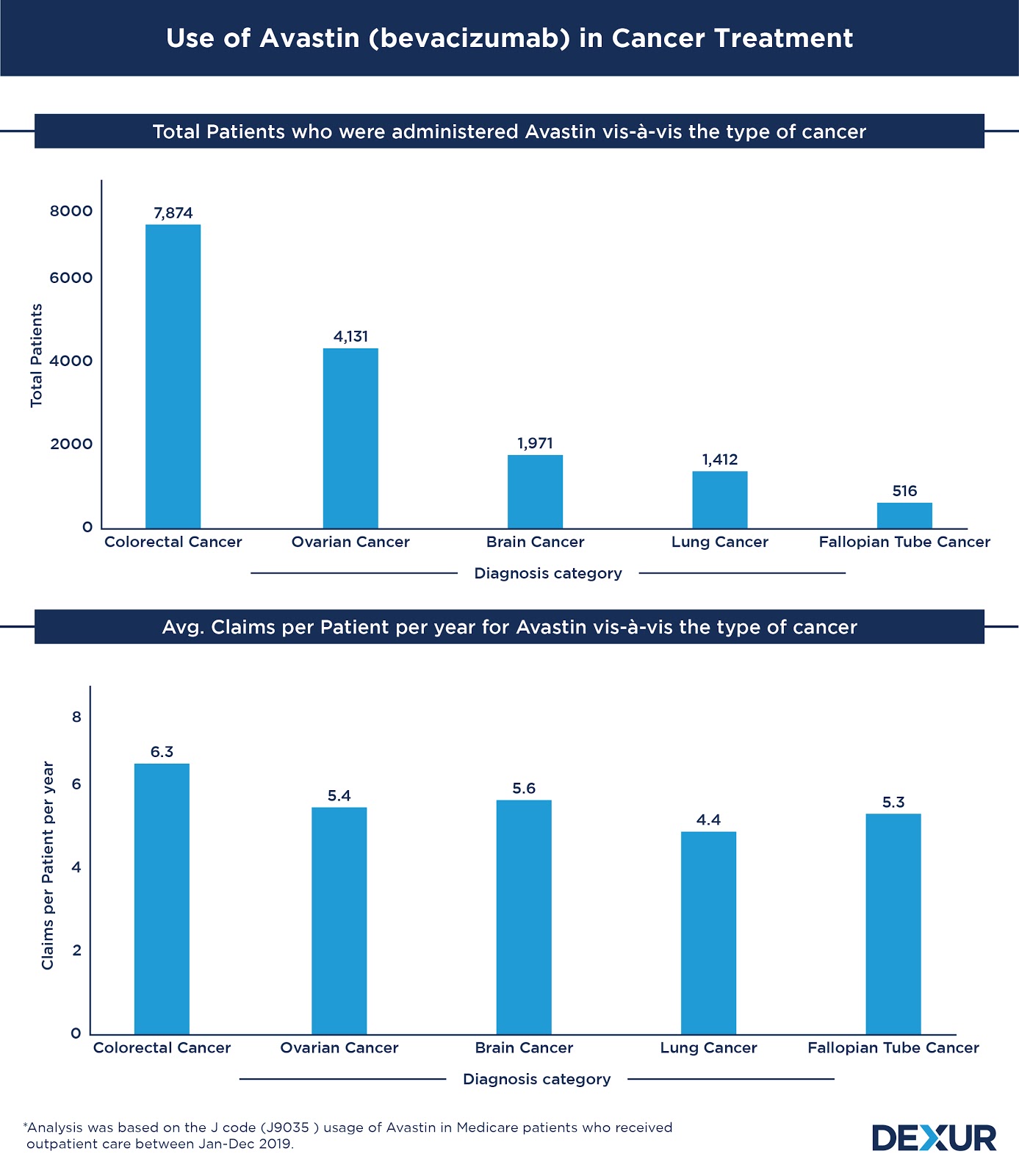Avastin is used more for Colorectal Cancer compared to Ovarian, Brain, Lung, and Fallopian Tube Cancer
Get Dexur’s Personalized Hospital Specific Presentation on Quality, Safety, Compliance & Education
By: Sruthy Iype Aug. 25, 2020
Dexur’s analysis of Medicare claims data showed that Avastin (bevacizumab) was used more in the treatment of patients with colorectal cancer, as compared to ovarian, brain, lung, and fallopian tube cancer. The analysis looked at the J code (J9035) usage of the drug among Medicare patients* who received outpatient care between Jan and Dec 2019. The analysis also looks at the average claims per patient data, which is a proxy for the number of injections / IV infusions / doses administered to a patient.
Genentech’s Avastin is a monoclonal antibody used as a targeted therapy, alone or in combination with other drugs, in the treatment of different types of cancer. It has also been proven effective in treating eye disorders such as age-related macular degeneration and diabetic retinopathy. Avastin belongs to the class of drugs called vascular endothelial growth factor (VEGF) inhibitors. By blocking the action of the angiogenesis-inducing VEGF produced by cancer cells, the drug stops the formation of new blood vessels that feed the tumor and helps to slow down the progression of the disease. The FDA approved indications of Avastin include certain types of colorectal cancer, non-small cell lung cancer, glioblastoma (a type of cancerous brain tumor), ovarian, fallopian tube, or primary peritoneal cancer, cervical cancer, renal cell carcinoma, and hepatocellular carcinoma. This study examines the use of Avastin with respect to the top 5 types of cancer where its usage has been observed.

| Diagnosis Category | Total Patients | Claims per Patient per year |
|---|---|---|
| Colorectal Cancer | 7,874 | 6.3 |
| Ovarian Cancer | 4,131 | 5.4 |
| Brain Cancer | 1,971 | 5.6 |
| Lung Cancer | 1,412 | 4.4 |
| Fallopian Tube Cancer | 516 | 5.3 |
The study showed that Avastin was used extensively in the treatment of colorectal cancer, its use associated with the diagnosis category surpassing the others by a huge margin. Between Jan and Dec 2019 the drug was administered to a total of 7,874 patients with colorectal cancer. These patients had an average of 6.3 claims per patient per year, which is relatively higher in comparison to patients with other types of cancer considered under the study.
Ovarian cancer was the second largest diagnosis category where the use of the drug was observed. During this period, 4,131 patients with ovarian cancer were administered Avastin as a part of their treatment, wherein each patient had 5.4 claims per year on an average.
Following ovarian cancer, the use of Avastin was most prevalent in the treatment of brain and lung cancer. While the 1,971 patients of brain cancer had an average of 5.6 claims each, the 1,412 patients of lung cancer who received the drug had 4.4 claims each.
Significant use of the drug was also seen in the treatment of patients with fallopian tube cancer during this period. Avastin was administered to 516 patients belonging to this diagnosis category, with each patient having an average of 5.3 claims per year.
* Individuals who received treatment for more than one type of cancer were considered as unique patients/claims under each of the concerned diagnosis categories, for the purpose of this analysis.